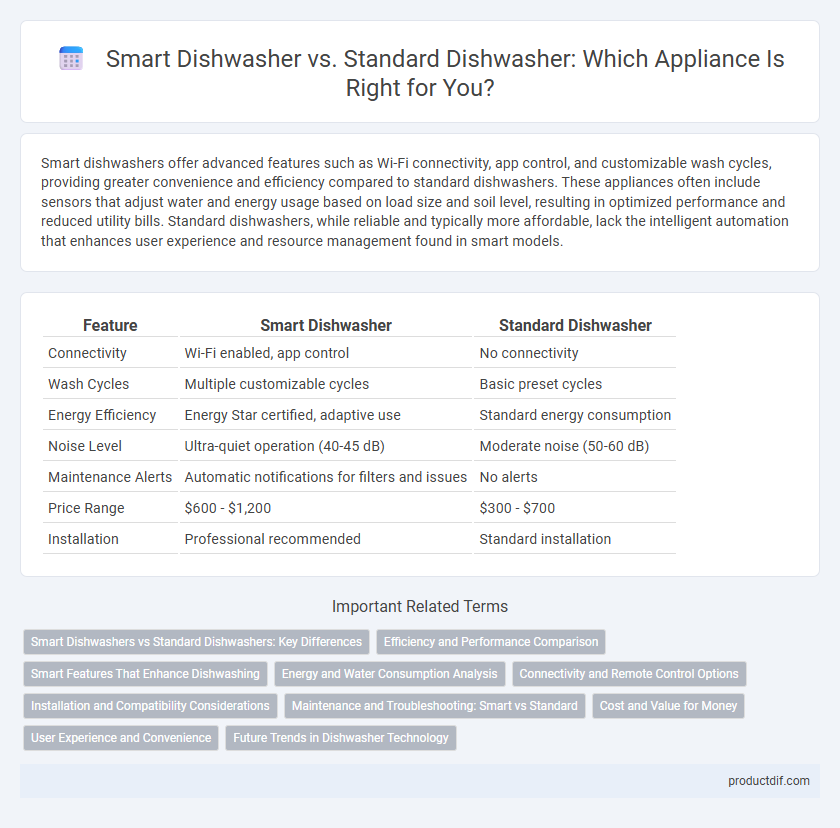Smart dishwashers offer advanced features such as Wi-Fi connectivity, app control, and customizable wash cycles, providing greater convenience and efficiency compared to standard dishwashers. These appliances often include sensors that adjust water and energy usage based on load size and soil level, resulting in optimized performance and reduced utility bills. Standard dishwashers, while reliable and typically more affordable, lack the intelligent automation that enhances user experience and resource management found in smart models.
Table of Comparison
| Feature | Smart Dishwasher | Standard Dishwasher |
|---|---|---|
| Connectivity | Wi-Fi enabled, app control | No connectivity |
| Wash Cycles | Multiple customizable cycles | Basic preset cycles |
| Energy Efficiency | Energy Star certified, adaptive use | Standard energy consumption |
| Noise Level | Ultra-quiet operation (40-45 dB) | Moderate noise (50-60 dB) |
| Maintenance Alerts | Automatic notifications for filters and issues | No alerts |
| Price Range | $600 - $1,200 | $300 - $700 |
| Installation | Professional recommended | Standard installation |
Smart Dishwashers vs Standard Dishwashers: Key Differences
Smart dishwashers offer advanced features such as Wi-Fi connectivity, app control, and sensor-based wash cycles, enhancing convenience and energy efficiency compared to standard dishwashers. Standard dishwashers typically provide basic washing functions without remote monitoring or adaptive cycle adjustments. The integration of smart technology in dishwashers allows for real-time status updates and maintenance alerts, which are absent in traditional models.
Efficiency and Performance Comparison
Smart dishwashers leverage advanced sensors and IoT connectivity to optimize water and energy usage, achieving up to 30% higher efficiency compared to standard models. These appliances adapt wash cycles based on load size and soil level, enhancing cleaning performance while reducing resource waste. In contrast, standard dishwashers operate with fixed cycles and consume more water and electricity, resulting in less efficient performance and higher utility costs.
Smart Features That Enhance Dishwashing
Smart dishwashers offer advanced features such as Wi-Fi connectivity, voice control through virtual assistants, and customizable wash cycles that optimize water and energy usage compared to standard dishwashers. Sensors in smart models detect soil level and adjust the wash parameters for superior cleaning performance and efficiency. Integration with smartphone apps allows real-time monitoring, remote control, and notifications, enhancing convenience and maintenance management.
Energy and Water Consumption Analysis
Smart dishwashers typically consume 30-50% less water and 20-40% less energy compared to standard dishwashers due to advanced sensors and optimized cycle settings. Energy Star-rated smart models utilize soil sensors and adaptive wash cycles that adjust water temperature and duration, significantly reducing resource consumption. In contrast, standard dishwashers often rely on fixed cycles that lead to higher energy and water usage, making smart dishwashers more efficient and environmentally friendly choices.
Connectivity and Remote Control Options
Smart dishwashers feature Wi-Fi connectivity that enables users to monitor and control wash cycles remotely through smartphone apps, enhancing convenience and customization. Standard dishwashers lack these connectivity features, requiring physical interaction for operation and cycle adjustments. Remote control options in smart models allow for real-time notifications and integration with smart home systems, optimizing appliance management.
Installation and Compatibility Considerations
Smart dishwashers often require Wi-Fi connectivity and compatible home automation systems for installation, which can add complexity compared to standard dishwashers that primarily need basic plumbing and electrical hookups. Installation of smart dishwashers may demand professional setup to configure network settings and integrate with voice assistants like Alexa or Google Home. Standard dishwashers offer broader compatibility with existing kitchen layouts and simpler installation processes, making them preferable for homeowners seeking straightforward appliance replacement.
Maintenance and Troubleshooting: Smart vs Standard
Smart dishwashers offer advanced diagnostic features that simplify maintenance by automatically detecting issues and suggesting precise troubleshooting steps through connected apps. Standard dishwashers typically require manual inspection and rely on user experience or professional technicians for problem identification and repair. While smart models reduce downtime and maintenance costs with predictive alerts, standard units may involve longer troubleshooting times and potentially higher service expenses.
Cost and Value for Money
Smart dishwashers typically have a higher upfront cost compared to standard dishwashers, often ranging from $700 to $1,500, while standard models usually cost between $400 and $700. The additional investment in smart dishwashers is justified by features like remote control, energy-saving cycles, and sensor-based cleaning, which enhance convenience and reduce long-term utility bills. Evaluating value for money involves considering these advanced functionalities against initial costs and potential energy savings over the appliance's lifespan.
User Experience and Convenience
Smart dishwashers enhance user experience through app control, remote monitoring, and customizable wash cycles, providing greater convenience compared to standard dishwashers with manual settings. Integration with voice assistants enables hands-free operation and real-time notifications, streamlining kitchen workflows. Advanced sensors in smart models optimize water and energy usage, reducing utility costs and improving overall efficiency.
Future Trends in Dishwasher Technology
Future trends in dishwasher technology emphasize increased energy efficiency, integration with smart home systems, and enhanced water conservation. Smart dishwashers utilize AI-powered sensors to optimize wash cycles, reducing resource consumption compared to standard dishwashers. Advancements in IoT connectivity enable remote monitoring and maintenance alerts, positioning smart dishwashers as a key innovation in the appliance market.
Smart Dishwasher vs Standard Dishwasher Infographic

 productdif.com
productdif.com